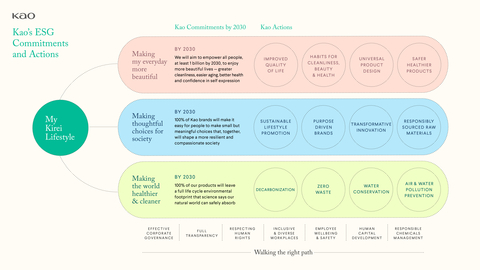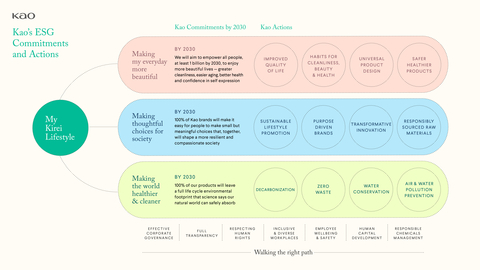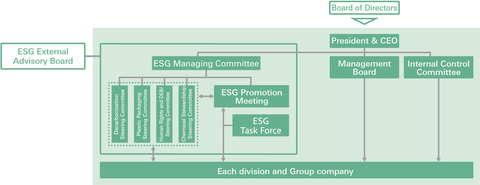TOKYO--(BUSINESS WIRE)--Kao Corporation, a Japan-based Group whose brand portfolio includes Attack, Bioré, Goldwell, Jergens, John Frieda, Kanebo, Laurier, Merries, and Molton Brown, released progress reports on its ESG (Environmental, Social, and Governance) strategy—the Kirei Lifestyle Plan. Details of its progress is released in the “Kao Sustainability Report 2022.” The report discloses the achievements of the key leadership action themes of 2021 as well as the internal carbon price increase to 18,500 yen/ton-CO2 to promote decarbonization. It also outlines revisions made to Kao’s biodiversity policy, and details the establishment of the new ESG steering committees, which will strengthen Kao’s ESG governance structure. It is available in English on Kao’s website from today.
Kao Sustainability Report 2022
https://www.kao.com/global/en/sustainability/pdf/#area-LocalNavBottom01
For over 130 years, Kao has worked to help consumers lead fulfilling lifestyles. In April 2019, Kao established the Kirei Lifestyle Plan, which is an ESG strategy that includes 19 leadership actions to achieve a sustainable and desirable way of living. The Japanese word 'kirei' describes something that is both clean and beautiful. For Kao, Kirei not only encapsulates appearance, but also attitude—to create beauty for oneself, other people, and for the world around us. Since its start in 2021, the Kao Group Mid-term Plan 2025 (K25) has proclaimed “protecting future lives” and promoting “sustainability as the only path” as its vision. The Kao Group will continue to integrate its ESG strategy into its management practices. It will also develop its business, provide better products and services for consumers and society, and work toward its purpose, “To Realize a Kirei World in Which All Life Lives in Harmony.”
The Director, Managing Executive Officer in charge of Kao’s ESG Division, Dave Muenz, delivered this message regarding the progress of the Kirei Lifestyle Plan announcement: “The expectation of our stakeholders for companies like Kao to help build a more sustainable society is intensifying year on year. Driven by the company’s long held value of ‘Integrity as the only choice’—doing what is right and holistic even if it may not be the easiest option—Kao has taken steps in 2021 that will help us continue to be a force of positive impact to the people that we serve, including setting ambitious decarbonization goals of aiming for carbon zero by 2040 and carbon negative by 2050. This year, our ESG governance structure has been reinforced by setting up four ESG steering committees that will address decarbonization, plastic packaging, human rights and DEI*1, and chemical stewardship. As a company dependent on natural capital such as palm oil, we have published a new policy around procurement which will help us work across our supply chain to ensure traceability and identify risks by arranging third-party audits of our suppliers. Kao will continue to work through collaborations and partnerships to create a Kirei Life for all.”
*1 Diversity, Equity, Inclusion
A leading international nonprofit organization, CDP, has included Kao in its prestigious ‘A List’ across three categories for the second year in a row. Also, the Ethisphere Institute, a leading US think-tank, has named Kao one of the World’s Most Ethical Companies for 16 consecutive years.
New Initiatives to Promote a Kirei Lifestyle
1. Raising the internal carbon price to 18,500 yen/ton-CO2 to promote decarbonization
In 2006, Kao introduced an internal carbon price system to curb CO2 emissions. Last year, it announced a new decarbonization goal and has increased the target rate of CO2 emission reduction from 22% in Scope 1+2*2 CO2 emissions (absolute value) to 55% (taking 2017 as the base year) by 2030. Consequently, Kao has raised the internal carbon price from the conventional 3,500 yen/ton-CO2 to 18,500 yen/ton-CO2*3. It will also promote the use of energy-saving equipment, the use of equipment with low CO2 emissions, and the procurement of renewable energy.
*2 The volume of greenhouse gases emitted directly by business enterprises and other organizations.
*3 This rate is the estimated 2035 carbon tax rate, based on the carbon tax rates included in the 2021 IEA World Energy Outlook. It is assumed that in the future, newly introduced equipment will continue to operate after 2030.
2. Establishment of the ESG steering committees to strengthen ESG governance structure
Since April 2022, in order to implement ESG initiatives reliably and promptly, the ESG steering committees have been newly established under the ESG Managing Committee to build a flexible and robust ESG governance structure to address the four priority issues of decarbonization, plastic packaging, human rights and DEI, and chemical stewardship. The executive-level leaders serve as the owner, and in conjunction with the ESG Managing Committee, recommendations will be made to each division and Group company. In each division, ESG is incorporated into divisional policies, goals, and plans to build effective governance. ESG governance structures at Group companies overseas are also organized into divisions, and are operated by group companies according to the content of activities.
3. Revision of biodiversity policy
Kao operates by benefiting from many biological resources such as palm oil, paper, and pulp. In 2011, Kao formed the “Basic Policies on Conservation of Biodiversity” and has been working to develop new technologies that contribute to sustainable raw material procurement and biodiversity conservation. The modern world aims to reduce the negative impacts on nature and biodiversity, increase actions that have a positive impact, and reverse the trend of biodiversity loss. With the revision of the global biodiversity goals at the 26th session of the Conference of the Parties, to the United Nations Framework Convention on Climate Change (COP26) in 2021, existing policy has been revised and in April 2022, the “Basic Policy on Biodiversity” was formed.
For the Key Leadership Action Themes: 2021 Activity Results, click the following URL.
https://www.kao.com/global/en/news/sustainability/2022/20220629-001/
About the Kirei Lifestyle Plan
Over the past 130 years, Kao has worked to improve people’s lives and help them realize more sustainable lifestyles—a Kirei Lifestyle. The Japanese word ‘kirei’ describes something that is clean, well-ordered and beautiful, all at the same time. The Kao Group established its ESG strategy, the Kirei Lifestyle Plan in April 2019, which is designed to deliver the vision of a gentler and more sustainable way of living. By 2030, Kao aims to empower at least 1 billion people, to enjoy more beautiful lives and have 100% of its products leave a full lifecycle environmental footprint that science says our natural world can safely absorb.
For more information please, click https://www.kao.com/global/en/sustainability/
About Kao
Kao creates high-value-added products and services that provide care and enrichment for the life of all people and the planet. Through its portfolio of over 20 leading brands such as Attack, Bioré, Goldwell, Jergens, John Frieda, Kanebo, Laurier, Merries, and Molton Brown, Kao is part of the everyday lives of people in Asia, Oceania, North America, and Europe. Combined with its chemical business, which contributes to a wide range of industries, Kao generates about 1,420 billion yen in annual sales. Kao employs about 33,500 people worldwide and has 135 years of history in innovation. Please visit the Kao Group website for updated information.
https://www.kao.com/global/en/
Related Information
Kao launches new ESG Strategy “Kirei Lifestyle Plan” to support consumer lifestyle changes
https://www.kao.com/global/en/news/sustainability/2019/20190422-001/
Kao Sustainability website
https://www.kao.com/global/en/sustainability/
Kao Integrated Report 2022
https://www.kao.com/global/en/investor-relations/library/reports/





